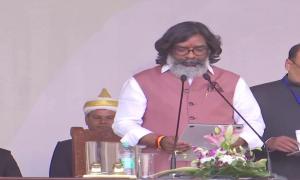With the theme 'Shrinking the world, Riding the wave', the Forum had delegates from the US, the UK, Canada, China, Costa Rica and Egypt attending it.
Listen to what an IT firm head honcho had to say on innovation in India:
It's time the Indian IT-BPO industry asked itself -- has it given the world its Nano yet -- or are we at least planning something on those lines which can put our industry firmly in the spotlight?
With innovation becoming the watchword of the Indian IT and BPO industry, the recognition by Nasscom of a series of sustaining innovations in companies ranging from Media Labs to Mango Technologies to multinational TI has left the industry asking for more -- and some disruptive breakthrough innovations too. (A disruptive technology or disruptive innovation is a technological innovation, product, or service that uses a "disruptive" strategy, rather than a "sustaining" strategy, to overturn the existing dominant technologies or status quo products in a market.)
Disruptive innovations have the potential to add over $50 billion of revenue to the industry by 2012 and it would be wonderful if all the partners in the innovation ecosystem took on a mission to make this transformation a reality.
Unlike in Cuba and Singapore, where innovation is almost entirely government-led and funded, there is a truly participative approach in our country, where large firms, entrepreneurs, academic institutions and of course the government have equal roles to play in the National Innovation Mission.
The formation of innovation clusters -- IT for automotive innovation in Pune and for telecom innovation in Chennai have already been initiated -- and the evolution of collaborative programmes with educational institutions needs to be intensified this year.
The outstanding work done by Professor Michael Porter of Harvard Business School has amply demonstrated that the cluster approach could transform the fortunes of any industry or country and needs to be embraced in a collaborative format in our own industry to see breakthrough success.
Business model innovation is manifest in the global delivery platform which could well draw inspiration from Dr Kalam's mention of virtual collaborative networks on the opening day of the summit.
The global delivery platform, in place already with various firms who are using talent from around the country and locations in Europe, China and Latin America to build new applications, has transformed the way businesses interact with IT by enabling disaggregated software development using collaborative tools and leverage the best talent from various locations.
Through this platform the domain expert is at the customer site taking requirement specifications, design and development happens at another location, and testing at a completely different location, capturing the best of all worlds.
Innovation is the best long term response to the input and environment pressures that the industry will continue to face. In the short term, Nasscom will continue to lead the way -- through its well established initiatives in IT workforce development, accreditation and registration programmes for young hopefuls and the wide ranging data security initiatives that are making India the best destination to build and support world class software.
This year will see the building of communities where our young talent can interact with business leaders and customers in a truly collaborative environment to reinforce India's thought leadership in the exciting knowledge universe.
Ganesh Natarajan is the vice-chairman, Nasscom, and global CEO, Zensar Technologies.
Also read:
Ganesh Natarajan is the vice-chairman, Nasscom, and global CEO, Zensar Technologies.
Also read:









More from rediff